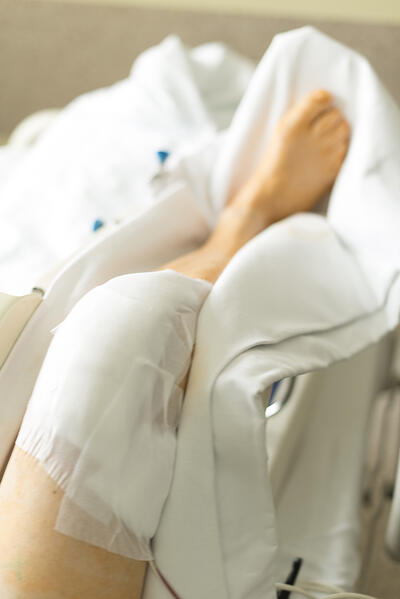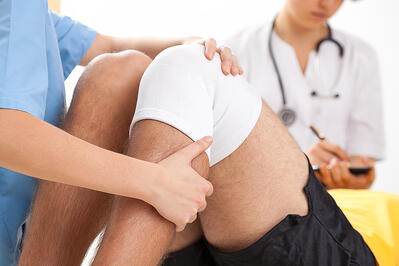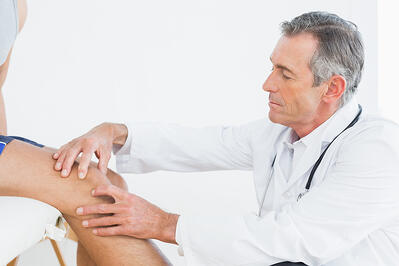The knee joint is formed where the femur, shinbone, and kneecap meet, connected by four main ligaments, including the anterior cruciate ligament (ACL). ACL ruptures or tears are the most common knee injuries, usually occurring from a sudden change of direction or pivoting, making them especially common among athletes. The goal of ACL surgery is to restore normal function of the knee and to eliminate the pain from the injury.
Is ACL surgery a major surgery?
 ACL surgery is a minimally-invasive, arthroscopic surgery. Minimally-invasive surgeries use smaller incisions than open surgeries, and generally offer faster recovery, with fewer health risks. However, because ACL surgery involves a complex reconstruction or replacement of a major tendon, it can be considered a major surgery.
ACL surgery is a minimally-invasive, arthroscopic surgery. Minimally-invasive surgeries use smaller incisions than open surgeries, and generally offer faster recovery, with fewer health risks. However, because ACL surgery involves a complex reconstruction or replacement of a major tendon, it can be considered a major surgery.
A torn or ruptured ACL must be completely removed and replaced with a piece of tendon or ligament tissue which is either donated from the patient (autograft reconstruction) or from a tissue bank donor (allograft reconstruction).
With any surgery, risks include negative reactions to anesthesia, bleeding, blood clots, and infection. Risks specific to ACL surgery may include problems with the graft healing, allograft infections, and knee stiffness or weakness after surgery.
Is ACL surgery painful?
ACL surgery can be performed with either general anesthesia, in which you are put completely to sleep, or with local anesthesia, in which you receive a nerve block, making you unable to feel any pain at the site of the surgery. If you have local anesthesia, you would also likely receive some sedation to help keep you relaxed during surgery.
An autograft reconstruction requires an extra, large incision at the donation site, so it is more painful than allograft reconstruction, which only requires one incision. The tissue for an autograft usually comes from a kneecap tendon, but it can also be taken from the hamstring or quadricep tendons. Surgery and healing time will be longer with autograft reconstruction.
Preparing for ACL Surgery
What is the best way to prepare for ACL surgery?
Staying healthy before any surgery may help lower your general surgical risks. Stop smoking and try to keep your diet healthy. Make sure to talk to your surgeon about medications you take, as you may need to stop them before surgery. Talk to your doctor if you have any illness prior to surgery, even if it’s a cold or small infection.
Sometimes your surgeon will want you to have several weeks of physical therapy prior to ACL surgery to help reduce the risk of limited mobility afterwards. Make sure you ask your doctor about other physical activities—it’s good to stay strong prior to ACL surgery, but you don’t want to do any further damage to the knee.
Because of the surgery medications, you need someone to help you get home the day of the surgery, so be sure to arrange transportation in advance. Wear loose, comfortable clothes that you can easily fit over knee bandages or a brace following surgery. It can be a good idea to practice using crutches before surgery so you feel comfortable getting around with them.
Follow all your surgeon’s instructions, and talk to your surgeon about any instructions you don’t understand.
What should I look for in an ACL surgeon?
You should choose an ACL surgeon who is an orthopedic and sports medicine specialist. You can find orthopedic specialists at West Suburban Medical Center who are specially trained in sports medicine, with extensive experience in minimally-invasive arthroscopic techniques, including ACL surgery.
Another consideration when thinking about any surgery is to find a specialist with whom you feel comfortable discussing all your treatment options. Although specialists at West Suburban Medical Center are experts at ACL surgery and other orthopedic procedures, they work with each patient individually to determine if surgery is right for them. For some patients, ACL surgery isn’t the best choice, and a West Suburban Medical Center sports medicine specialist can recommend more conservative options, including physical therapy at the Rehabilitation and Sports Medicine Center at the River Forest Medical Campus.
Can I eat before ACL surgery?
Usually you will be instructed not to eat or drink after midnight the night before your surgery to reduce risks related to anesthesia. Always talk to your doctor about medications you are taking, and discuss if they should be stopped prior to surgery, and follow specific pre-surgery instructions from your surgeon.
Recovery
How long does it take to recover from ACL surgery?
 You won’t be able to bear weight on the injured leg for two to three weeks. Once you can bear weight again, it can take several months for the connective tissue graft to fully heal, so you’ll be less active during that time.
You won’t be able to bear weight on the injured leg for two to three weeks. Once you can bear weight again, it can take several months for the connective tissue graft to fully heal, so you’ll be less active during that time.
After a few weeks, you’ll have a follow-up appointment with your surgeon to check the range of motion in your knee, examine the incision(s), and prescribe progressive physical therapy. Physical therapy for ACL surgery is conveniently available at the Rehabilitation and Sports Medicine Center at the River Forest Medical Campus.
If you play sports, you may not be able to return to your sport at full intensity for six to twelve months. Some people may need functional bracing, especially during sports and certain physical activities, for up to two years.
What activities are restricted after ACL surgery?
Generally you cannot do any weight-bearing activities for several weeks. Depending on which leg has been operated on, it may be several weeks before you can drive.
You won’t be able to keep your leg bent for long periods of time, but you also shouldn’t keep your knee still for long periods of time. Be sure to do any exercises prescribed by your doctor or therapist following surgery to ensure full recovery of the knee’s range of motion.
What can I expect after ACL surgery?
After ACL surgery, you will be able to go home the same day, with your knee bandaged, or in a brace or splint. Before you’re discharged from the hospital, you may be asked to practice with your crutches or even perform some exercises. Because of the medications used during surgery, you’ll need help getting home, so transportation should be arranged in advance.
Your doctor will likely recommend that you ice your knee after surgery, and that you rest with the leg elevated. You’ll be able to manage pain with over-the-counter drugs like ibuprofen and acetaminophen, or your doctor may give you prescription pain medications.
Your surgeon will give you instructions on how to care for the incision and look for signs of infection, including: high fever, swelling or pain in the calf, discharge or extreme bleeding from the incision, and pain that can’t be managed with medication.
Regular function, including stability and range of motion, can often be restored to the knee after successful ACL reconstruction surgery and physical therapy. Results from surgery can vary, depending on the success of the tissue graft, how well you follow pre-surgery and post-surgery instructions, as well as adherence to rehabilitation.
Learn more about orthopedic treatments at West Suburban Medical Center. Our orthopedic specialists offer a wide range of orthopedic services, from minimally invasive arthroscopic surgeries to total joint replacements.

